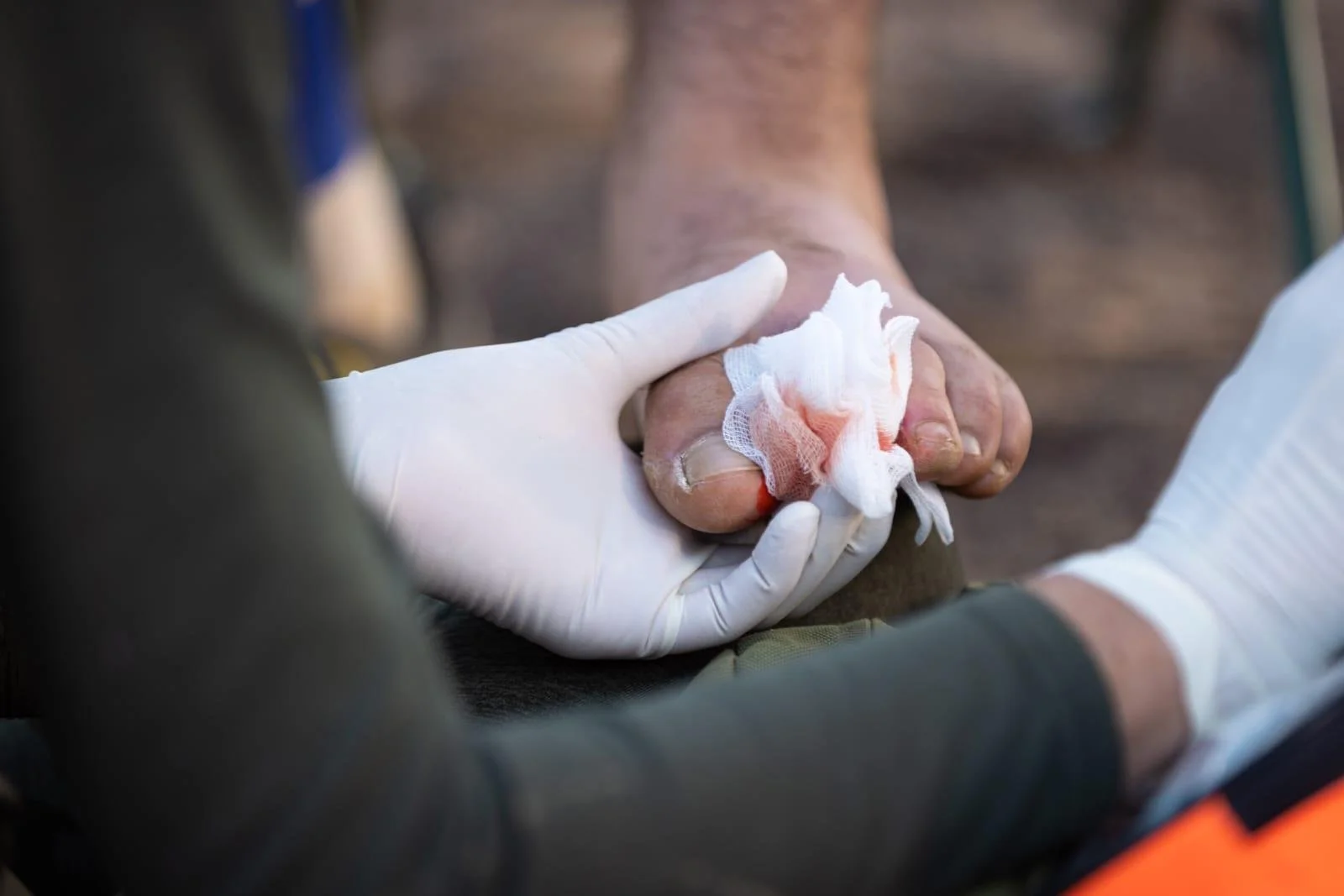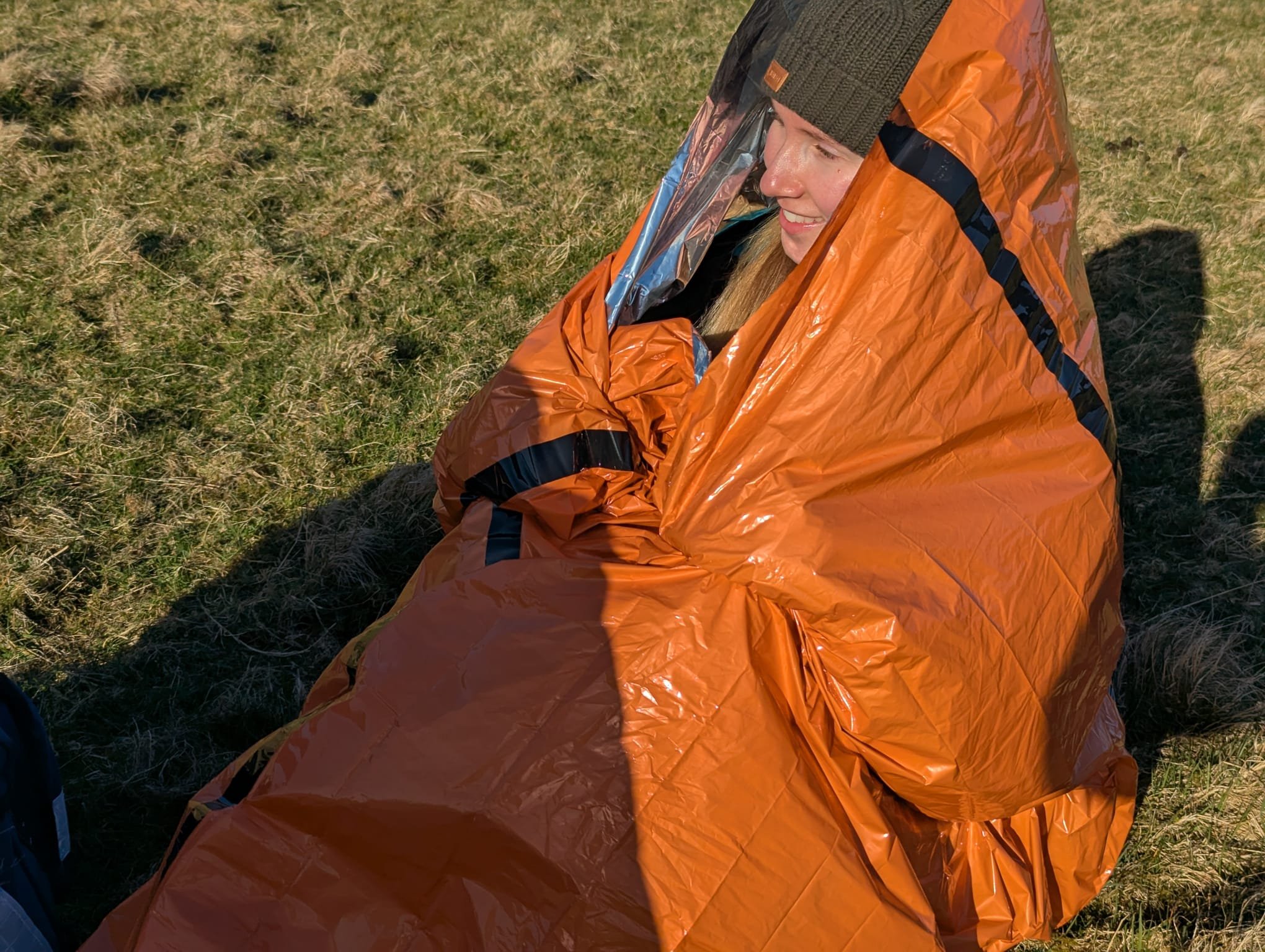Conquering the Ultra | Insights from the Medics (Part 3)
Performing on the Day: TrailMed Medics' Insights
TrailMed's Event Medical team is privileged to work with the leading ultra-marathon providers, including Action Challenge and their Ultra Trail Series, providing preventive and responsive medical care to all participants and crew members.
We caught up with TrailMed's multi-disciplinary team (doctors, nurses, paramedics and emergency responders) to discuss the common presentations for ultra-marathon walkers so that you can learn how best to avoid these pitfalls.
Blisters, if left untreated can become a burden that will seriously impact your ultra walking experience.
Blisters
Blisters during events are mainly caused by friction, heat, and moisture. Ill-fitting shoes or socks, combined with sweaty feet, increase the risk. Proper foot care is essential: identify and tape blister-prone areas before events, as well as pad areas to prevent injuries. Kinaesthetic (KT) tape is recommended as it mimics skin elasticity and reduces friction. About 95% of TrailMed's ultra-challenge participants face blister issues, so preventing and treating blisters is crucial for a comfortable experience. TrailMed has produced an Essential Footcare Guide, designed explicitly for ultra-marathon walkers, which can help guide you through preventive and reactive blister care during training.
Dehydration
Dehydration can sneak up on you, especially during intense physical activity like walking ultra marathons, where fluid and electrolyte loss can negatively impact your health and performance. For example, during events such as the Thames Path Challenge or the Jurassic Coast Challenge, participants often face long hours of exertion under varying weather conditions, making hydration crucial.
To prevent dehydration, it is essential to drink fluids regularly, even if you don't feel thirsty, and use electrolyte solutions to maintain balance. TrailMed recommends PH Electrolyte products, available in tablets or sachets in a range of strengths (500, 1000, 1500), so you can target dehydration effectively without impacting your performance. If dehydration occurs, rest in a shaded area, drink water or electrolyte drinks, and seek medical attention from the TrailMed Medical Team if severe. These steps help ensure you stay hydrated and maintain your performance throughout the event.
Hypoglycaemia
Low blood sugar, or hypoglycaemia, can significantly disrupt your performance during ultramarathon events. To prevent this, it is essential to monitor your blood sugar levels frequently and consume balanced meals and snacks that include carbohydrates and protein. Avoid skipping meals and ensure you have quick sources of sugar, such as glucose tablets or gels, readily available. If feeling unwell or unsure, seek medical help from the TrailMed Medical Team to address any underlying issues and prevent further complications.
Exhaustion
Exhaustion is a natural part of pushing your limits, especially during demanding activities like walking ultramarathons. For instance, events such as the Peak District Challenge or the London to Brighton Challenge require participants to endure long distances and challenging terrains, making it crucial to manage your energy levels effectively.
To prevent exhaustion, pace yourself and take regular breaks. Listen to your body and adjust your pace as needed to avoid overexertion. If you experience exhaustion, the best course of action is to rest, hydrate, and consume energy-boosting snacks to aid recovery. These steps can help you maintain your stamina and complete the event safely and successfully.
Sickness and Gastrointestinal Problems
Sickness and gastrointestinal problems can significantly disrupt your progress, especially during critical times such as during your ultra-marathon event. To prevent these issues, it is crucial to avoid unfamiliar foods that might upset your stomach and instead stick to your tried-and-tested nutrition plan. Remember, there is nothing new at the event!
This approach helps ensure that your body receives the nutrients it is accustomed to, reducing the risk of gastrointestinal distress. If you experience sickness or gastrointestinal problems, the best course of action is to rest, hydrate adequately, and consume bland foods that are gentle on your stomach. These steps can help alleviate symptoms and promote recovery. However, if symptoms persist or worsen, it is important to seek medical help from the TrailMed Medical Team to address any underlying issues and prevent further complications.
Carrying a lightweight Emergency Bivvy Bag is an essential piece of kit. Keeping you warm and dry whilst you await help.
Hypo/Hyperthermia
Hypothermia and hyperthermia can both significantly disrupt your performance during walking ultramarathons. For example, events such as the South Downs Way or the Isle of Wight Challenge require participants to endure long distances and varying weather conditions, making it crucial to manage your body temperature effectively.
Hypothermia occurs when your body temperature drops below 95°F (35°C), often due to exposure to cold weather or immersion in cold water. Symptoms include shivering, slurred speech, slow breathing, weak pulse, clumsiness, and confusion. To prevent hypothermia, wear appropriate clothing, layer fabrics to protect sensitive areas, and stay dry. If hypothermia occurs, move to a warm, dry location, try to (where possible) remove wet clothing, and try to warm the person or yourself by adding layers and getting inside an Emergency Bivvy Bag. Seek medical attention from the TrailMed Medical team if unsure or if symptoms persist or worsen.
Hyperthermia occurs when your body temperature rises above normal levels, typically due to prolonged exposure to high temperatures or intense physical activity. Symptoms include dizziness, weakness, nausea, thirst, headache, and confusion. To prevent hyperthermia, stay hydrated, limit physical activity in hot weather, and take regular breaks in shaded areas. If hyperthermia occurs, move to a cooler area, rest, and drink fluids with electrolytes. Seek medical attention from the TrailMed Medical team if unsure or if symptoms persist or worsen.
Conclusion
Walking an ultra marathon is a remarkable achievement that requires dedication, preparation, and resilience. By focusing on your mindset, equipping yourself properly, training effectively, and being prepared for common issues, you'll be well on your way to crossing that finish line. Remember, every step you take is a step closer to your goal.
Happy walking!


